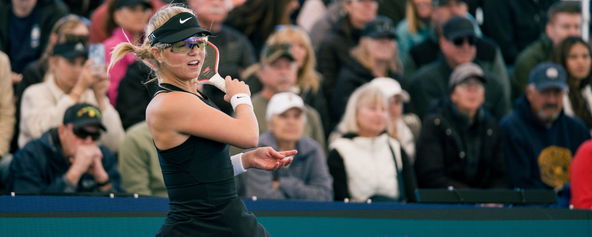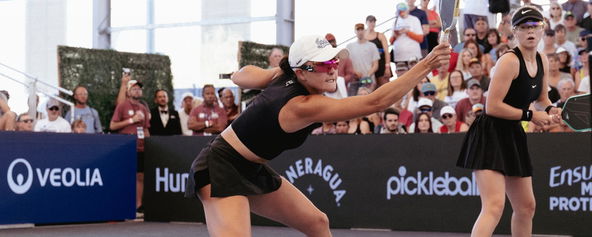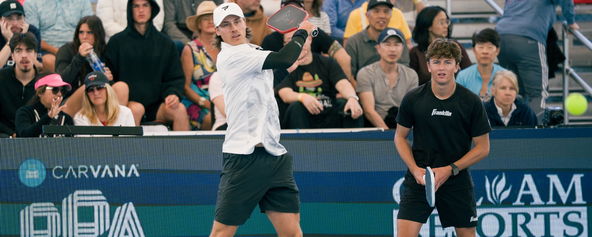
Highlights from the Stratusphere Gin Virginia Beach Cup
Jim Kloss
Oct 08, 2024 09:30 AM ET
The Stratusphere Gin Virginia Beach Cup is in the books. The tournament featured some of the best action ever. The quarterfinal matches were particularly exciting, and we had a couple of nail-biter finals. Before we move on to the next event in Las Vegas, it is worth looking at some of the highlights from Virginia Beach.
1. Every point matters
Saying that every point matters is a cliché, but sometimes clichés are accurate and true. There are three tournaments left in the points race to make the PPA Championships. The battle to qualify for the last couple of spots will certainly come down to the last event. There are a number of excellent players, big names, who are either just inside the cut line or just outside looking in. Making a quarterfinal versus getting knocked out in the Round of 16 can potentially get a person in. For example, Riley Newman is 10th among men for mixed doubles (eight make it) and 15th in men’s doubles (16 make it). He grabbed a 4th in men’s doubles and a bronze in mixed in Virginia Beach, setting him up to potentially make the PPA Championship in both events. Watch the next couple of tournaments with an eye toward players on the bubble, and see if they can make the move needed to make the cut in each event.
2. Timeouts matter?
There is often a lot of discussion during matches about whether a player or team should call a timeout. Many players will take a timeout after losing 3-4 points in a row. Other players seem to disdain time outs. Ben Johns and Collin Johns are famous for usually not calling timeouts. In the men’s doubles final, one time out that they did take proved crucial to the outcome. Facing Federico Staksrud and Hayden Patriquin, the Johns brothers lost game one, but came back to win games two and three and they had a lead in game four. But with the score tightening, the Johns brothers took a timeout, or at least thought they did. Head referee Don Stanley ruled that Ben and Collin failed to properly signal the timeout, and as it was the second infraction, penalized them by deducting a point. Stanley was correct under the rules to do so, and the Johns did not really argue the ruling. But, that ruling appeared to change all momentum in the match and Staksrud and Patriquin ran off a number of quick points to win game four 11-8, and then game five 11-2. Did the time out ruling change the outcome? We will never know, but it sure did looked like it might have. The ruling was correct, and I’m not debating whether it should or should not have been made, simply that it did appear to potentially decide that fourth game and the match.
3. Yes, timeouts matter
Players are only given a certain number of line call challenges per match. And, in order to use one, you must have a timeout remaining. Use up your timeouts and you cannot challenge a call. This rarely matters, but it sure did in the women’s doubles quarterfinal between Anna Bright/Rachel Rohrabacher v Allyce Jones/Tyra Black. The match went to a third game and it was close all the way. Serving at 10-11, Tyra Black hit a shot for a winner, but it was called out. Replay showed the ball to be in, but Black/Jones did not have a timeout left and thus could not challenge. Bright and Rohrabacher went on to win 13-11. This is not to single out anyone for a bad call, as every pickleball player will make a wrong call sometimes. Is the lesson here to preserve a timeout so you can always challenge? Or perhaps the PPA should change the rule to allow each side two challenges per game, regardless of timeout status. This would make challenges independent of timeout status. Additionally, if a challenge is made successfully, the party making the challenge should get their challenge back. I see nothing wrong with a player/team making four or five challenges in a game and being right each time. The PPA should examine the challenge rule and disconnect it from the timeout rule.
4. Move me up the seeding ladder
Seedings each tournament are based on points accumulated over the course of the year. So, when a player is rapidly improving, their seeding may well not reflect their current talent level. A couple of examples of this were on display in Virginia Beach. Kate Fahey is, without a doubt, a top 5 singles player. But, she was seeded 11 in Virginia Beach and as she has done tournament after tournament since the summer, her results bested her seeding as she won the bronze. Similarly, Zoey Wang has been proving again and again she is a top 10-15 player. She again made the quarters in both singles and women’s doubles, with a win in singles over Catherine Parenteau. Her 13 seed was not indicative of her skill level. Look for better and better players to be lining up Fahey and Wang as partners, which is another key to success in PPA doubles play.
5. Bright not shining at mixed
Anna Bright and James Ignatowich were one of the top mixed doubles teams, often seeded second and often finishing on the medal stand. However, after their well publicized breakup, both on and off the court, neither has enjoyed the same level of success as before at mixed doubles. Bright in particular has played with top partners. At Virginia Beach, Bright played with Andrei Daescu. Seeded third, they lost in the Round of 16. In Las Vegas, Bright will play with her MLP teammate Hayden Patriquin. Will they be more successful? I like that pairing and look for Bright/Patriquin to play a lot together going forward, with success.
6. The event with the upsets
Men’s singles continues to be the place for the underdogs. At Virginia Beach, the men’s singles Round of 16 featured the presence of the 41, 42, and 47 seeds! Men’s singles is the event where tennis skills most quickly translate and thus a new, hard hitter can make some waves. Always then look to see whether those former tennis players can make the transition to doubles. Many do not, with their success limited to pickleball singles. Others master the touch needed to play doubles and go on to be very successful and top doubles players, such as Jaume Martinez Vich or Kate Fahey. Who will be next?
Virginia Beach was awesome. Next up is Las Vegas, where we will not have rain, but it will be near 100 degrees. The action should be fast and furious, with players seeking the points needed to make the PPA Championships. Hope to see you there!
Follow me on Twitter/X @pickleball_jim.
Related articles

Carvana PPA Tour announces 2026-2027 schedule featuring marquee U.S. and international events
The health of professional pickleball has never been stronger.
2 hours ago
-PPA Staff

Sofia Sewing joining PPA Tour in January 2027
The standout talent will be an exciting addition to the circuit.
5 hours ago
-Pickleball.com Staff

Big crowds and a big upset at Carvana Mesa Cup
The play did not disappoint as Anna Leigh Waters and Ben Johns both went into Sunday with a shot at a Triple Crown.
1 day ago
-Jim Kloss

Alshon, Patriquin hungry for golden opportunity on Championship Sunday
Christian Alshon and Hayden Patriquin want to finally reach the top of the mountain.
2 days ago
-Pickleball.com Staff